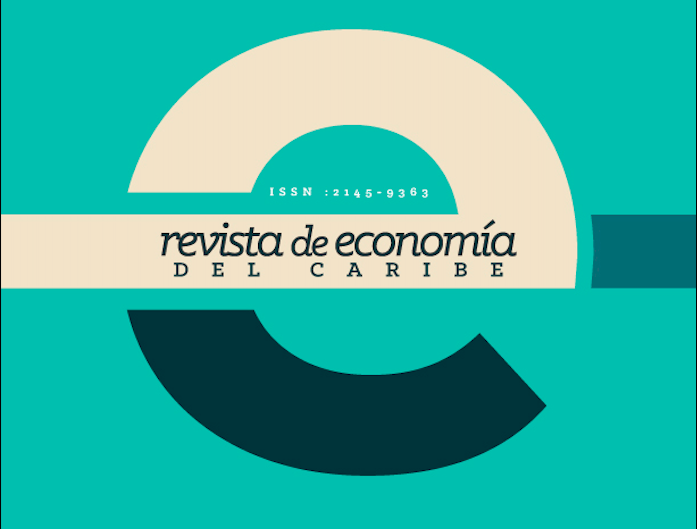Mining-energy boom and deepening of dependence in Colombia: insertion in an export model of productive specialization post-1990
Keywords:
primary-export model, productive specialization, mining-energy sector, macroeconomic vulnerability, foreign capital flowsAbstract
This article aims to advance the understanding of the causes of the greater dependence and vulnerability of the Colombian economy, as a result of the process of trade liberalization and financial deregulation, which began in the country in the early 1990s. It is argued that the insertion in a primary-export model of productive specialization, aimed at commodities of the extractive sector, has deepened macroeconomic instability in recent years, given the recurring fluctuations in the international price of mining-energy products. In addition, it is stated that the granting of greater benefits to foreign capital that invests in this sector has contributed to the exacerbation of dependence.
References
Acosta, A. (2010). Maldiciones que amenazan la democracia. Nueva Sociedad, 229, 42-61.
Arango, C. (2012). Discursos y tensiones presentes en la legislación minera: el código de minas ley 685 de 2001 y su reforma ley 1382 de 2010 [Tesis de pregrado] Universidad EAFIT. https://hdl.handle.net/10784/716
Bonilla, R. (2011). Apertura y reprimarización de la economía colombiana: un paraíso de corto plazo. Nueva Sociedad, 22(231), 46-65.
Cano, W. (2000). Soberania e política econômica na América Latina. São Paulo: UNESP.
Cano, W. (2017). Brasil: construção e desconstrução do desenvolvimento (Texto para discussão n° 304). Instituto de Economia, Unicamp. https://www.eco.unicamp.br/images/arquivos/artigos/3533/TD304.pdf
Clavijo, S., Vera, A., & Fandiño, A. (2012). La desindustrialización en Colombia. Bogotá: Anif
Fiori, J. (2011). Brasil e América do sul: O desafio da inserção internacional soberana (Texto para Discussão, No. 1560). Instituto de Pesquisa Econômica Aplicada (IPEA). https://www.econstor.eu/bitstream/10419/90934/1/661596303.pdf
Goda, T., & Torres García, A. (2015). Flujos de capital, recursos naturales y enfermedad holandesa: el caso colombiano. Ensayos sobre Política Económica, 33(78), 197-206. https://doi.org/10.1016/j.espe.2015.07.001
López, E., Montes, E., Garavito, A., & Collazos, M. M. (2012). La economía petrolera en Colombia (Parte I) Marco legal - contractual y principales eslabones de la cadena de producción (1920-2010). (Borradores de economía No. 100). Banco de la República. https://repositorio.banrep.gov.co/bitstream/handle/20.500.12134/5709/be_692.pdf
Maldonado, A. A. (2010). La evolución del crecimiento industrial y la transformación productiva en Colombia 1970-2005: patrones y determinantes [Tesis de maestría]. Universidad Nacional de Colombia. https://repositorio.unal.edu.co/handle/unal/69903
Ocampo, J. A. (2007). Historia económica de Colombia. Bogotá: Planeta.
Osorio, J. (2012). América Latina: o novo padrão exportador de especialização produtiva - estudo de cinco economias da região. São Paulo: Boitempo.
Otero, D. (2012). El sector energético-minero y la economía colombiana. Bucaramanga: INDEPAZ. Palomá Parra, L. O. (2014). Las zonas mineras y el bloque de derechos étnicos en Colombia. Revista Nuevos Paradigmas de las Ciencias Sociales Latinoamericanas, 5(9), 1-8.
Powell, A. (2015). El laberinto: Cómo América Latina y el Caribe puede navegar en la economía global. Washington D.C: Banco Interamericano de Desarrollo.
Redondo, J. (2018). História econômica e comércio exterior na Colômbia: uma análise do setor minero-energético e seu papel no aprofundamento do perfil primário-exportador do país pós-1990 [Tesis de maestria] Instituto de Economia da Universidade Estadual de Campinas. https://www.repositorio.unicamp.br/bitstream/REPOSIP/332427/1/Ochoa_JoseDavidRedondo_M.pdf
Svampa, M. N. (2013). Consenso de los Commodities y lenguajes de valoración en América Latina. Nueva Sociedad, 2(244), 30-46.
Uribe, J. D. (2012). Algunas lecciones relevantes aprendidas de la crisis financiera colombiana 1998-1999. Bogotá: Banco de la República.
Vásquez, A. (2016). Panorama del sector minero-energético colombiano: comportamiento empresarial y diagnóstico laboral y sindical. (Documentos de la Escuela, No. 105). Escuela Nacional Sindical. https://www.ens.org.co/wp-content/uploads/2016/11/DOCUMENTOS-DE-LA-ESCUELA_105-Sector-minero-energ%C3%A9tico-colombiano-Comportamiento-empresarial-y-diagn %C3%B3stico-laboral-y-sindical-2016.pdf
Zuluaga, J. (2017). Enfermedad holandesa: profundización de la desindustrialización en Colombia durante la bonanza minero-energética 2007-2014. [Tesis de grado]. Universidad del Valle. https://bibliotecadigital.univalle.edu.co/handle/10893/10427
Published
Issue
Section
License
I, ____________________________________________, author of the work and/ or article, adult, residing in the city of _________________, bearing the Identity Card/Passport n.° ______________________, issued in _______________________, in command of his/her/their physical and mental faculties, party hereinafter referred to as AUTHOR, signs the following authorization so the reproduction, publication, communication and distribution of the work can be done, under the following terms:
1. That, regardless of existing legal regulations due to the relationship of the parties to this contract, and any other existing legal presumption, the parties agree that the AUTHOR authorizes the Universidad del Norte, with the purpose of reproduce, publish, communicate and distribute the material called in the Revista de Economía del Caribe.
2. That such authorization apply to the copyright of the work, by any means, known or to be known, the public communication of the work, and the distribution of the work, directly or by third parties, purely educational purposes.
3. The AUTHOR undertakes to inform and declare the existence of this authorization and to preserve the right of the journal Revista de Economía del Caribe to the first publication of the work.
4. The AUTHOR states that the article is original and his/her/their exclusive creation, there being no impediment of any kind for the authorization he/she/they is/are giving, responding thereto by any action: claim, plagiarism or any other type of complaint that might arise about.
5. That such authorization is granted for free.
6. The moral rights of the author on the article correspond exclusively to the AUTHOR, in virtue of which, the Universidad del Norte agrees to expressly and rigorously recognize and respect them.





























